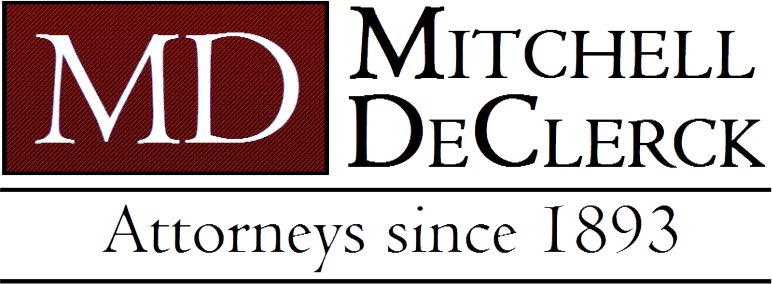Answers To Questions About The Impact Of Bankruptcy On Debts
The team at Mitchell DeClerck, PLLC, has attempted to answer the most frequently asked questions about bankruptcy in Oklahoma. These are culled from the questions our clients have asked us. We hope this will be helpful.
This is not intended as legal advice. Bankruptcy is complicated and advice is contingent on the specific circumstances unique to each debtor. If you are considering bankruptcy, call us toll-free at 580-498-1787 for a free consultation. We will provide specific legal advice tailored to your specific unique situation. There is no obligation, and the call is confidential.
Is All Debt Discharged By Bankruptcy?
No. Debts that cannot be discharged vary slightly between the different chapters of bankruptcy, but typically the following cannot be discharged:
- Debts for taxes owed to local, state or federal agencies
- Debts for money, property, services, or an extension, renewal, or refinancing of credit, which was obtained fraudulently
- Debts that were not in the initial list of debts that you listed in your bankruptcy petition
- Debts owed to a spouse, former spouse, or child, for alimony, maintenance, or support of a spouse or child, with a separation agreement, divorce decree or another order of a court of record
- Debts owed for injury to another person or property owned by another like those granted by a court in a judgment
- Debts for government-sponsored educational loans, unless it can be shown that repayment will cause an undue hardship
- Debts for death or personal injury caused by the debtor’s drunk driving or from driving while under the influence of drugs or other substances such as in a judgment by a court
- Debts incurred after a bankruptcy was filed
There may be other debts that are not discharged, and there may be exceptions to the above list. Call us at 580-498-1787 to discuss.
What Is A Reaffirmation Agreement?
The process of renewing your obligation to pay a debt is called reaffirmation or reaffirming. Reaffirming a debt is voluntary and is not required by the law. You may voluntarily repay any debt instead of signing a reaffirmation agreement, but there may be other reasons that you will want to reaffirm a specific debt such as a vehicle loan. For example, if you owe money on your primary automobile but are delinquent and want to keep the automobile, you may want to reaffirm the debt to make the lender happy and allow you to retain the automobile provided you pay the debt.
Can I Stop Creditors From Contacting Me After I File Bankruptcy?
After you file, you are immediately protected from your creditors, and they must stop all attempts to contact you or collect their debt. This is called an automatic stay. Thereafter, if a creditor attempts to collect a debt, immediately notify the creditor in writing that you have filed bankruptcy, and provide them with the case name, case number and filing date, or provide a copy of the petition that shows it was filed. If the creditor still continues to attempt to collect the debt, you may be entitled to take legal action against it. If you have a lawyer, the lawyer will typically handle this for you.
Is It Possible For My Creditors To Object To My Bankruptcy Filing Or Plan?
Yes. Bankruptcy filings allow creditors to object to how specific debts are paid in a Chapter 13 plan or the repayment or cancellation in its entirety. In Chapter 7, creditors normally have 60 days after the first meeting of creditors to object to the discharge of a specific debt. If no objections are filed, the court issues the discharge order, the trustee collects and sells non-assets, and then distributes the proceeds to the creditors as prescribed by law. If there are objections, the bankruptcy proceedings, less the objected debt(s), continue. A trial may be required to determine the objectionable issues. In Chapter 13, creditors can object to the Chapter 13 plan for repayment and the court may take this into consideration. If there are no objections filed by creditors or the trustee, the plan may be confirmed as filed.
How Do Secured And Unsecured Debt Differ?
- A secured debt is a claim that is secured by some type of property or collateral, either by an agreement or involuntarily with a court judgment or taxes. Creditors can generally eventually claim the property and foreclose or repossess it to pay the debt in the event of bankruptcy. If you have such a situation, you should consider a Chapter 13.
- Unsecured debt does not have collateral, and a creditor cannot claim it if you file for bankruptcy. For example, a mortgage is a secured debt on your property.
Is There A Minimum Amount Of Debt To File Bankruptcy?
No. Nevertheless, your situation may be one in which a bankruptcy is unwise. If your financial situation is temporary, you should consider contacting individual creditors seeking a change in payment amounts or a reduction in the total amount due. If you do not have much property or money that you do have is exempt, a bankruptcy may be unwarranted, as there may be nothing the creditor can do to collect the debt. Often the involvement of a good bankruptcy lawyer can be persuasive and dissuade the creditor from acting.
If One Files For Bankruptcy, Is A Co-Signor Responsible For The Debt?
Yes. In Chapter 7, the creditor can require the co-signor to make payments on a loan once the principal has filed bankruptcy – if payments are delinquent. This makes it extremely important when considering whether to co-sign a loan: Be ready, and able to pay the loan in the event that the principal signor defaults.
Conversely, if a Chapter 13 is filed, the law imposes a co-debtor stay – much like the automatic stay – against actions to collect the debt from a co-signer until that co-debtor stay is lifted. Moreover, if the debtor proposes a Chapter 13 plan that pays the debt in full, that co-debtor stay will normally remain in place and the non-filing co-debtor not bothered
If My Former Spouse Files Bankruptcy, Will My Divorce Decree Help Me?
No. If you are a co-signor with your ex-spouse on a debt and the ex-spouse files bankruptcy, the creditor can require the entire payment of that debt from you even though the divorce decree orders your ex-spouse to pay that debt. Your divorce decree may address the recourse you may have – if any – against your ex-spouse should they default on the loan obligations.
Must I Discharge All Of My Debts Or Can I Pay Some And Not Others?
You are legally obligated to list and include all the debts that you owe in your petition and schedules. You may opt to keep some debts by reaffirming one or more specific debts.
How Long After Filing Bankruptcy Can I Apply For Credit?
The decision whether to grant you credit in the future is strictly up to the creditor and varies with the creditor. There is no law that requires or prevents anyone from extending credit to you immediately after you file bankruptcy. This is often one reason for a debtor to reaffirm with one or more creditors to retain their goodwill so a creditor might continue to extend you credit.
Can One Spouse File For Bankruptcy But Not The Other?
Yes. If one spouse files and the other does not, the one who does not file may be responsible for the debts. This is something that requires careful thought and analysis. For example, if one spouse is only obligated on a small amount of debt, it may make sense for that spouse to not file for bankruptcy so that spouse might have better or even good credit regardless of what the filing spouse does.
What If I Forgot To List A Creditor In My Bankruptcy Papers?
After filing the petition, you may typically file an amendment to correct it what you filed in error if you discover that an entry is inaccurate or missing. The bankruptcy petition and schedules are filed under the penalty of perjury; consequently, it is extremely important to carefully review the initial filing for completeness and accuracy. Furthermore, any debt that is not listed is not discharged, and you will be responsible for it.
Is There Anything I Can Do To Delete Bankruptcy From My Credit Report?
No. However, you may want to file an explanation with the credit reporting agencies briefly describing the events resulting in your bankruptcy. If an account is inaccurately reported, you can request the record be updated to reflect the true facts.
How Are My Creditors Notified That I Have Filed For Bankruptcy?
Shortly after you file, the bankruptcy court notifies, by mail, all creditors advising them of:
- The filing of the bankruptcy
- The case number
- The automatic stay
- The name of the trustee assigned to the case
- The date set for the first meeting of creditors
- The deadline, if any, set for filing objections to the discharge of debts
- Whether and where to file claims
The exact information in the notice may be slightly different depending on the chapter filed or where the debtor filed.
Can I Avoid Bankruptcy By Using A “Credit Repair” Agency?
Generally, consumers can be just as effective as a credit repair company in dealing with credit reporting agencies and improving their credit ratings, but it takes time and patience. Although there are nonprofit companies in each state that offer credit guidance for a small fee, credit repair companies offer very little when compared to the fees they charge. Worse yet, some are counterproductive taking money from debtors for their fees and doing nothing in return.
Does My Bankruptcy Filing Remain On My Credit Record For Long?
Bankruptcies remain on credit reports anywhere from seven up to 10 years.
Get Answers Today For All Your Bankruptcy Questions
Call 580-498-1787 or send us an inquiry email about a free consultation. We will be in touch. Located in Enid, we serve clients throughout Garfield County.
We are a debt relief agency. We help people file for bankruptcy relief under the Bankruptcy Code.

